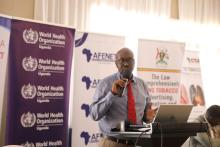Uganda launches Global Adult Tobacco Survey report, reaffirming commitment to safeguard youth from tobacco harm
Kampala, Uganda — The Ministry of Health, with support from World Health Organization (WHO), African Field Epidemiology Network (AFENET), Uganda Bureau of Statistics (UBOS), and other stakeholders, has today officially launched the 2023 Global Adult Tobacco Survey (GATS) report. The findings reflect Uganda’s progress in tobacco control while flagging emerging threats, especially among young people.
The report was launched during the national commemoration of the 2025 World No Tobacco Day in Kampala, under the global theme “Unmasking the Appeal.” Overall tobacco use decreased from 7.9% in 2013 to 6.7% in 2023. Among women, tobacco use dropped from 4.6% to 2.6%, and smokeless tobacco use declined by 34.4% overall, including a 57.9% decrease among women. Exposure to secondhand smoke also fell significantly in homes, workplaces, restaurants, and schools.
Dr Charles Oyoo Akiya, Commissioner Health Services in charge of non-communicable diseases at the Ministry of Health, urged stakeholders to use the findings to strengthen enforcement of tobacco control measures.
“While we celebrate progress, we cannot ignore the evolving tactics of the tobacco industry. We must double our efforts to close enforcement gaps, raise awareness, and protect every Ugandan, especially the youth, from the lifelong consequences of tobacco use,” said Dr Akiya.
Uganda is the second African country after Ethiopia to launch the GATS report 2023, which is a nationally representative survey based on global standards for monitoring adult tobacco use (smoked, smokeless, and heated tobacco products) and tracking key tobacco control indicators. The survey helps countries fulfill their obligations under the WHO Framework Convention on Tobacco Control (FCTC) by providing globally comparable data.
Since ratifying the WHO Framework Convention on Tobacco Control (WHO FCTC) in 2007, Uganda has taken robust legal steps by enacting the Tobacco Control Act (2015) and the Tobacco Control Regulations (2019). These laws ban smoking in public places, ban tobacco advertising, promotion, and sponsorship, while restricting the production, importation, and sale of certain tobacco products, such as shisha, e-cigarettes, heated tobacco products, smokeless tobacco, and flavoured tobacco products including flavoured cigarettes. They also require graphic health warnings to cover 65% of cigarette packaging display areas and prohibit sales to minors.
Despite these advances, the GATS report identifies persistent challenges. Tobacco use among men has remained largely unchanged, and quit attempts stagnate at 44%. Public exposure to anti-smoking messages has dropped from 70.6% in 2013 to 52.9% in 2023, while support for increasing tobacco taxes is wanting. Meanwhile, products like shisha and e-cigarettes are gaining popularity among young people, driven by aggressive industry marketing through flavours, sleek packaging, and digital campaigns to attract a new generation of users.
“Government now needs to prioritize awareness creation to debunk the misleading information used by the tobacco industry and provide accurate information to the public especially the youth on the dangers of these tobacco products,” said Dr Kasonde Mwinga, WHO Representative in Uganda.
Between 2022 and 2024, WHO supported Ministry of Health to build enforcement capacity across Bugisu, Busoga, Greater Masaka, Bunyoro, and Kigezi. These sessions equipped over 155 law enforcers with skills in inspection, awareness creation, enforcement operations, compliance assessment, and prosecution. Customs officers at the borders of Entebbe, Busia, Zombo/Padea, Kamdini, Goli, Oraba and Gulu also received training to enforce the ban on illicit tobacco products. University student leaders from six institutions in central Uganda were empowered to become tobacco control advocates among their peers. WHO further supported MOH draft regulations for testing contents and emissions in tobacco products to enhance local capacity for enforcement of the law.
The GATS 2023 findings affirm that tobacco control measures are effective but face the risk of complacency. WHO remains committed to supporting Uganda in advancing a healthier, tobacco-free future, particularly for its young population. To sustain these gains and meet the global target of a 30% reduction in tobacco use by 2030, Uganda must intensify enforcement, and implement the WHO MPOWER package for demand reduction.
In line with the WHO Framework Convention on Tobacco Control, WHO introduced the MPOWER measures in 2008. MPOWER are a set of six cost-effective and high impact measures that help countries reduce demand for tobacco. These measures include:
• Monitoring tobacco use and prevention policies.
• Protecting people from tobacco smoke.
• Offering help to quit tobacco use.
• Warning about the dangers of tobacco.
• Enforcing bans on tobacco advertising, promotion and sponsorship.
• Raising taxes on tobacco.
It’s imperative to increase awareness among the population, ratify the protocol to eliminate illicit trade in tobacco products, increase tobacco taxes, expand cessation services nationwide effectively counter interference from the tobacco industry among other measures.

